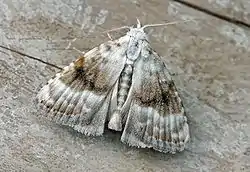| Meganola albula | |
|---|---|
 | |
| Scientific classification | |
| Domain: | Eukaryota |
| Kingdom: | Animalia |
| Phylum: | Arthropoda |
| Class: | Insecta |
| Order: | Lepidoptera |
| Superfamily: | Noctuoidea |
| Family: | Nolidae |
| Genus: | Meganola |
| Species: | M. albula |
| Binomial name | |
| Meganola albula (Denis & Schiffermüller, 1775) | |
Meganola albula, the Kent black arches, is a moth of the family Nolidae. The species was first described by Michael Denis and Ignaz Schiffermüller in 1775. It is found in the Palearctic realm (Europe, Asia Minor, Iran, Caucasus, Russian Far East, Japan).
The wingspan is 18–24 mm. The length of the forewings is 10–11 mm. The moth flies in one generation from mid-June to August .

Fig. 5, 5a, 5b larvae after last moult 5c cocoon attached to a stem
The larvae feed on Rubus,[1] Fragaria vesca and Vaccinium species.
Since the 19th-century, it has spread north being first recorded in England in 1859, Denmark 1938, Schleswig-Holstein 1945 and Gotland 1949
Notes
- ^ The flight season refers to Belgium and the Netherlands. This may vary in other parts of the range.
References
- ↑ Robinson, Gaden S.; Ackery, Phillip R.; Kitching, Ian J.; Beccaloni, George W. & Hernández, Luis M. (2010). "Search the database - introduction and help". HOSTS - A Database of the World's Lepidopteran Hostplants. Natural History Museum, London.
External links
Wikimedia Commons has media related to Meganola albula.
- Kimber, Ian. "74.002 BF2076 Kent Black Arches Meganola albula ([Denis & Schiffermüller], 1775)". UKMoths. Retrieved 8 August 2020.
- Lepidoptera of Belgium
- Lepiforum e. V.
- De Vlinderstichting. (in Dutch)
This article is issued from Wikipedia. The text is licensed under Creative Commons - Attribution - Sharealike. Additional terms may apply for the media files.